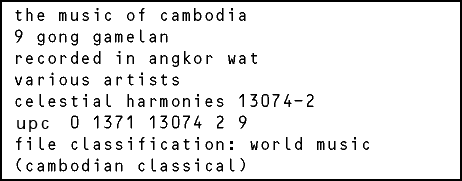 |
|||||||||||||||||||||||||||||||||||||||||||||||||||||||||
 
the projectOn the heels of the historic elections of May 1993
came the first release in The Music of Cambodia series. It
features instruments and musical styles never before heard outside
of Cambodia, and was recorded in one of the greatest architectural
achievements in all of Asia - the legendary temple complex of Angkor
Wat. The 9 Gong Gamelan, featured prominently in the first
volume of The Music of Cambodia, is a relative of the famous
gamelan instruments of Indonesia, but is virtually unknown outside
the area around Angkor Wat. Given the opportunity to record one of
the world's rarest instruments inside one of the world's great architectural
masterpieces, producer David Parsons found an enormous wealth of lively,
traditional music in the Angkor Wat region.
The first volume in The Music of Cambodia series features four different musical styles. The pinpeat orchestra is a local version of the royal court music of the great Khmer Empire of the 9th–15th centuries. Sinuous melodies on oboe and fiddle wend their way over an intricate bed of interlocking wood and metal percussion instruments. The funeral music, featuring the rare 9–gong gamelan and its ensemble, has a restrained dignity, but is also quite spirited at times. There is also an example of solo oboe music. The oboists in Cambodia never pause for breath, having mastered the technique of playing while inhaling as well as exhaling. In addition, the folk dance music of the tribal minorities of northwestern Cambodia are included. Cambodian music is a mystery to most of the world, and the music around Angkor Wat is a mystery even to the rest of Cambodia. But it is a mystery whose beauties are easily revealed to Western ears. the artistsThe musicians who performed in Angkor Wat are all
residents of the farms and villages surrounding the Angkor temple
complex. Although being rice farmers and not professional musicians,
the level of musical expertise is high. The reason, simply, is that
music is a part of their everyday lives.
Producer David Parsons, from New Zealand, is a composer and synthesizer artist whose previous recordings (all available from Fortuna Records/Celestial Harmonies) have featured the sounds of Central Asia. He is also the producer of Sacred Ceremonies, Volumes 1 and 2 (17074) and 17079), the music of Tibetan Buddhism. tracklist
|
|||||||||||||||||||||||||||||||||||||||||||||||||||||||||
|
|
|||||||||||||||||||||||||||||||||||||||||||||||||||||||||
 |


